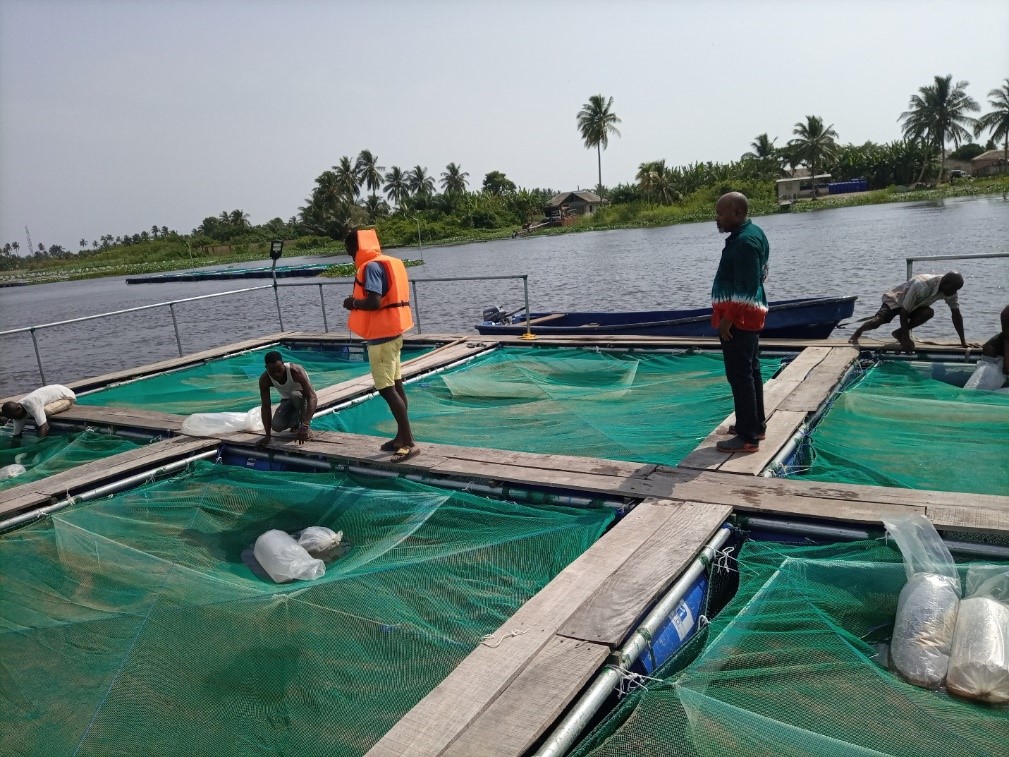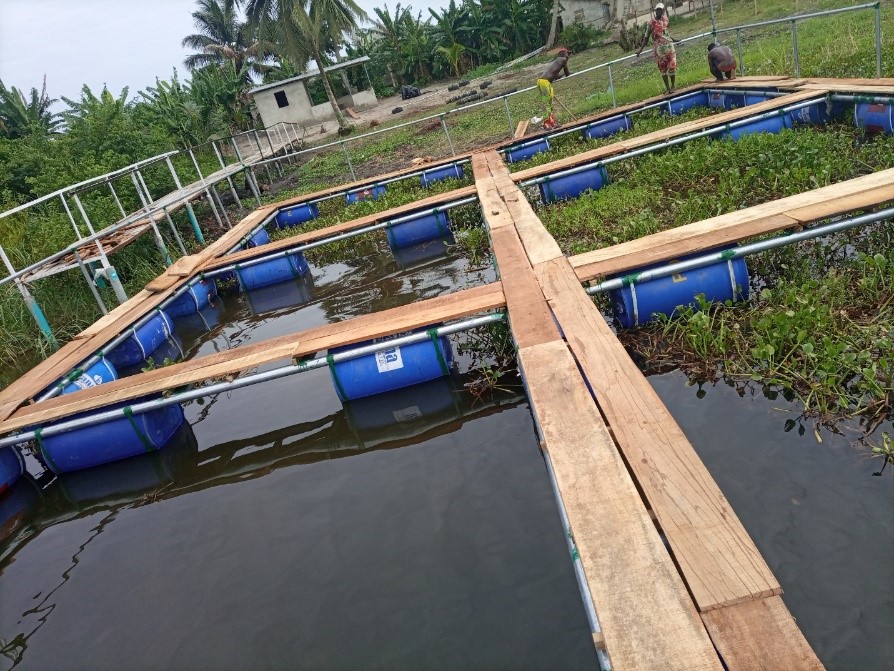 Sustainable Cage Aquaculture in West Africa
Improving livelihoods by introducing cage aquaculture to rural communities in Ghana and Nigeria
Sustainable Cage Aquaculture in West Africa
Improving livelihoods by introducing cage aquaculture to rural communities in Ghana and Nigeria

Challenges
Food insecurity is widespread in Africa. In 2020, 281.6 million of the continent’s inhabitants were undernourished, an increase of 89.1 million since 2014 (FAO, 2021). COVID-19 worsened food shortages, as food and agriculture value chains suffered from drastic lock-down measures to contain the pandemic’s spread.
Ghana and Nigeria, in West Africa, depend on fish as major sources of animal protein. Ghana relies on its fishery sector to meet the growing population’s protein requirement, but in recent years marine production has faced a 30 percent decline due to overexploitation (FAO, 2016). In Nigeria, the region’s most populous country, fish account for around 40 percent of the nation's protein intake (FAO, 2018). Rapid population growth is increasing the supply-demand gap in Nigeria which could further exacerbate nutrition challenges – 58 percent of the population already suffer from moderate or severe food insecurity (World Bank, 2019).
Both Ghana and Nigeria have numerous water bodies that have the potential for greater aquaculture production using cage culture, thus reducing dependence on capture fisheries and the supplementation of domestic fish catch with imported fish. Cage culturing can enable rural farmers to grow fish without necessarily owning land and in water bodies in which draining and seining would normally be impossible.
Towards a Solution
The Promoting Sustainable Cage Aquaculture in West Africa (ProSCAWA) project is a China-IFAD South-South and Triangular Cooperation Facility-funded intervention. Implemented by WorldFish, a CGIAR partner research institution, the project empowers and transforms the livelihoods of smallholder farmers in West Africa through the adoption of sustainable technologies and provision of capacity building training in cage aquaculture. The project objectives are to improve the productive capacities of rural populations in the two countries by enabling them to undertake sustainable aquaculture that will increase productivity of their waterbodies and to strengthen the environmental sustainability and climate resilience of their economic activities through application of climate-smart technologies and products across the aquaculture value chain.
Aquaculture is vulnerable to a combination of climatic factors, such as global warming, rainfall variation, flood, drought, temperature fluctuation and salinity changes. Considering the vulnerability of fish production to the impact of climate change, tilapia farming is one possible strategy for adaptation. Tilapia is tolerant to low water levels and poor water quality, making tilapia cage farming possible in a wide range of water environments, from fresh to brackish water.
The project promotes knowledge-based solutions sharing and investment opportunities through collaboration between Chinese firms and local institutions in Ghana and Nigeria. For its implementation, the project selected two private sector farms in Ghana and Nigeria to support the development of cage sites, which serve as demonstration and teaching units for rural residents, including women and youth.
To date, six cages each in Nigeria and Ghana have been fabricated locally and 12 cages procured from Chinese suppliers. The offloading and construction of the cages created an income source and temporary employment opportunities for at least 20 community members around the project sites. In Nigeria, more than 50,000 pieces of Tilapia fish seedling were mobilized for the demonstration site and 1,770 kilograms of nursery and grow-out fish feed was procured. Each project site acquired a boat to allow for accessibility and to carry out routine management practices when the cages are stocked with fingerlings. WorldFish provided electronic weighing scales and water-quality monitoring test kits to monitor water quality parameters (such as pH, temperature and dissolved oxygen) and the growth of fish.
To ensure local ownership and sustainability, the project offers capacity building activities, such as basic aquaculture training to equip labourers with the requisite technical skills to effectively carry-out day-to-day operations on fish farms and ultimately become well-trained supervisors of general fish farm operations and management. A blended learning approach has been adopted, that includes face-to face instruction, instructional storytelling, slide shows, question and answer sessions and site visits to local fish farms for practical training. In Ghana, English was combined with the local Twi and Ewe languages during instruction to ensure a better understanding of concepts.
So far, 71 farmers have been trained across Ghana and Nigeria on best practice management for cage aquaculture and the project is targeting 900 additional beneficiaries by 2023. For further capacity building, exchange visits are planned to Egypt, Kenya and Mozambique for experience sharing and networking on aquaculture technologies and business.
The introduction of tilapia cage farming as climate smart aquaculture for optimum utilization of available water bodies for producing aquatic foods will increase incomes and create jobs within rural communities in the two countries. Smallholder farmers’ access to new technologies, such as better yielding seed, quality fish feed and fish processing, is of great benefit to rural economies.
Contact Information
Countries involved
Supported by
Implementing Entities
Project Status
Project Period
URL of the practice
Primary SDG
Primary SDG Targets
Secondary SDGs
Secondary SDG Targets
Similar Solutions
| NAME OF SOLUTION | Countries | SDG | Project Status | |
|---|---|---|---|---|
A Billion Brains: Smarter Children, Healthier Economies High Level Meeting on South-South Cooperation for Child Rights |
Ghana, Nigeria | 17 - Partnerships for the Goals | Completed | View Details |
ACP Business-friendly Supporting business-friendly and inclusive national and regional policies, and strengthening productive capabilities and value chains |
Ghana, Nigeria | 08 - Decent Work and Economic Growth 17 - Partnerships for the Goals | Ongoing | View Details |
ADAPT PLAN in Malawi |
Ghana, Nigeria | 01 - No Poverty 05 - Gender Equality 11 - Sustainable Cities and Communities | Ongoing | View Details |
Addressing Racial and Ethnicity-based Discrimination and Strengthening the Protection of Rural Afro-descendants UNFPA supports data disaggregation as a tool to fight racism and ethnic discrimination |
Ghana, Nigeria | 01 - No Poverty 02 - Zero Hunger 03 - Good Health and Well-being 05 - Gender Equality 06 - Clean Water and Sanitation 11 - Sustainable Cities and Communities 16 - Peace and Justice Strong Institutions | Ongoing | View Details |
Addressing the Philippine Dairy Sector Challenges Exchanging knowledge between Argentina and the Philippines to improve Philippine local dairy production |
Ghana, Nigeria | 08 - Decent Work and Economic Growth 17 - Partnerships for the Goals | Ongoing | View Details |

